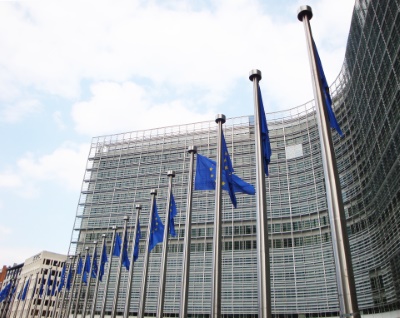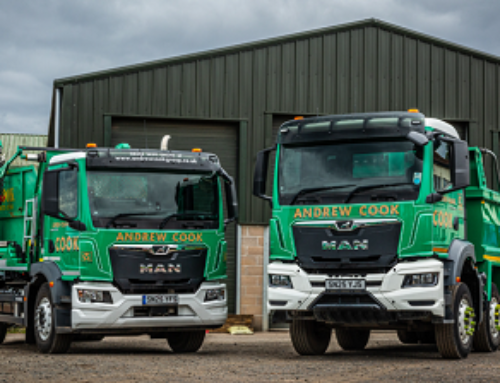Truck makers call for action from Europe on decarbonisation
Vehicle manufacturers engaged in strategic dialogue on the future of the automotive sector with European officials in September, and used the opportunity to urge a review of heavy vehicle CO2 standards and progress on charging and grid infrastructure.
In high-level meetings led by European Commission president Ursula von der Leyen, discussions focused on areas including securing EU leadership in the electric vehicle transition and strengthening the domestic battery manufacturing sector, as well as accelerating progress on autonomous and connected vehicles.
As part of the event, the Commission outlined its commitment to safeguarding European firms against unfair competition and improving access to critical raw materials, as well as supporting workers through reskilling. Meanwhile, commissioners Ekaterina Zaharieva and Apostolos Tzitzikostas signed a memorandum of understanding with stakeholders committing to the acceleration of automotive research and innovation at EU level, with a focus on sustainable and smart mobility.
But talks also enabled the manufacturing sector and other relevant parties to provide input on the Commission’s initiatives for the road transport sector, including a review of rules around CO2 emission performance standards.
ACEA, the European vehicle manufacturers’ association, welcomed the talks and their focus on the structural challenges facing the sector and Europe more widely.
“We agree with the Commission president that bold and fast action is required,” said Ola Källenius, ACEA president and CEO of Mercedes-Benz. “No one has more at stake in the success of zero-emission mobility than Europe’s automakers. A thriving Europe needs us, and we need a thriving Europe.”
According to ACEA, the European Commission recognised that action was needed with regard to passenger cars, light and heavy commercial vehicles.
“In all these three sectors of road transport, electrification will be the dominant path to zero-emission,” said ACEA.
“Doubling down on demand measures and enabling conditions, such as cheap energy and abundant charging infrastructure, therefore remains a prerequisite to make this systemic transition a success.”
It warned that trucks and buses currently represented just 3.5 per cent of registrations of battery-electric vehicles, due to a lack of headway on supporting infrastructure. Specifically, slow progress on grid capacity and megawatt charging, as well as on initiatives to incentivise the purchase of electric vehicles by fleet operators, was holding back uptake.
According to ACEA, industry leaders are arguing that the EU cannot wait until 2027 to review CO2 standards for the heavy-duty vehicle sector, and warn that urgent monitoring and action are needed to ensure the road freight industry is on track as regards climate neutrality.
“Truck and bus makers are committed to Europe’s green transition: the vehicles are ready, but the enabling conditions are not,” said Christian Levin, CEO of Traton Group and Scania, following the talks. “We appreciate [commissioners’] recognition that our sector faces distinct challenges requiring dedicated attention, and we look forward to swiftly working together on urgent, tailored measures in a short-term follow-up meeting.”
Prior to the talks, Mr Levin had emphasised that most of the ‘essential enabling conditions’ for the transition to zero-emission vehicles were currently not in place, despite manufacturers’ progress in offering solutions for all transport needs.
“If all the other pieces don’t fall into place, we will fail. This is not a failure of engineering, it’s a failure of policy,” he warned.
He said of the need for a review of heavy-duty vehicle CO2 standards: “This cannot wait until 2027. We need an urgent assessment and monitoring of the most critical enabling conditions for the climate-neutrality transition of heavy-duty road transport.
“The success of the climate neutrality transition does not depend on vehicle manufacturers alone. Yet we are the only actors exposed to disproportionate non-compliance penalties despite being most ready to deliver.”
In the wake of the discussions, ACEA also said that concrete steps were required to make the CO2 policy framework for vans and cars “fit for reality”.
Ola Källenius said dialogue had been “open and constructive”.
“We may not have cleared all differences yet, nor have the answers to all challenges. But we are positive to see the solution space is broadening, and confident the work of the next months will yield results. Europe simply has to deliver on all accounts: decarbonisation, competitiveness and supply chain resilience.”
Daimler Truck CEO Karin Rådström said the talks “felt like a big step forward”.
“We’re all-in on zero-emission transport, but we need real action on infrastructure and cost parity,” she said.
“Today, Europe has just 1,200 public truck charging stations – we need at least 35,000 charging points and 2,000 H2 refuelling stations by 2030. That’s 500 new charging points every month. And switching to zero emission has to make sense for our customers…
“The EU Commission heard us and is already planning the next roundtable in six weeks. We’re pushing for an early revision of CO2 fleet targets and a simpler legal framework (let’s skip all “stupid” rules that do not improve road safety or help the transition to zero emission)…
“At Daimler Truck, we’re ready to deliver climate-friendly transport solutions. With all stakeholders at the table, I’m convinced we can find pragmatic ways to keep the world moving.”













